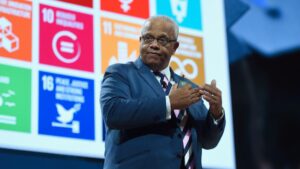The Next Frontier: How Businesses Can Lead the Charge on Migration
In a world increasingly shaped by migration, business leaders have an unprecedented opportunity—almost a moral imperative—to lead the charge in addressing the challenges posed by this global phenomenon. As we gather insights from thought leaders like Lord Dr. Michael Hastings, it’s clear that tackling the issues surrounding refugees and asylum seekers will be the next major challenge for organizations across the globe.
The Global Migration Crisis
According to Lord Dr. Hastings, a respected leadership professor and UNICEF vice president, over 120 million people around the globe have relocated from their homes—many driven from their countries due to conflict, violence, or natural disasters. The European Commission highlights that low- and middle-income countries accommodate a staggering 75% of these refugees, with a significant portion living in dire poverty.
Hastings emphasizes that while many organizations have stepped up to tackle climate change—reducing carbon emissions and minimizing single-use plastics—the urgent concern of migration remains. "Climate is a big deal," Hastings asserts, "but migration is the next big thing. We need to grab that one too."
A Call to Action for Businesses
As leaders in the business community, we must ask ourselves: How can we provide education, housing, legal support, and employment opportunities for displaced individuals? Hastings challenges corporate leaders to "grab" the issue of migration, inviting them to consider the dignity and prospects of refugees and asylum seekers.
At Extreme Investor Network, we believe businesses that embrace this challenge will emerge as societal leaders. Engaging with this issue can create immense value—not just for the individuals affected but also for the organizations that support them. Companies that cultivate inclusive workplaces can tap into diverse talents, enhancing creativity and innovation.
The Role of Leadership
Hastings has dedicated his career to advocating for underrepresented groups. He argues that true leadership is about servitude rather than control, stating, “A leader, more than anything else, has got to be a vulnerable person who knows that the real purpose of a leader is to empower others to rise.” This philosophy resonates deeply at Extreme Investor Network, where we encourage leaders to cultivate purpose-driven organizations focused on creating impactful change in society.
Economic Potential of Integration
Investing in refugees isn’t merely a humanitarian endeavor; it also brings economic benefits. When businesses hire refugees, they tap into a reservoir of talent that can drive innovation and growth. Companies that proactively engage refugees can also enhance their corporate social responsibility (CSR) profiles and improve customer loyalty.
Our research indicates that consumers are increasingly leaning towards brands that prioritize social impact. By championing the cause of displaced individuals, organizations can differentiate themselves in a competitive marketplace. This alignment of business goals with social responsibility is the essence of sustainable innovation.
A Collaborative Approach
Addressing the complexities of migration requires collaboration amongst governments, businesses, and NGOs. Hastings calls for a concerted effort to understand the root causes of migration. "Let’s go back to the source of the supply and genuinely invest in prospects and futures in peacemaking," he suggests. This holistic approach could lead to lasting benefits—creating stability, fostering community, and empowering generations.
Conclusion
The pressures of migration present a unique challenge, but they also offer an incredible opportunity for innovation within businesses. At Extreme Investor Network, we believe that the organizations willing to engage with this issue head-on will not only transform lives but also redefine their own trajectories. As we move forward, let us integrate purpose into our business strategies, thereby embracing the role of leaders in a world that is in desperate need of compassionate visionaries.
Together, we can bend the power of the prosperous toward the potential of the poor—creating a more inclusive, innovative, and thriving future for all. Let’s not wait for change; let’s be the change.

